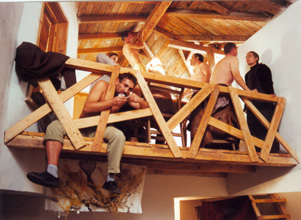Sadbata kato plach
Ein Rattendasein
Fate as a Rat
Iwan Pawlow
Bulgarien/Mazedonien 2001 |
| |
|
 |
|
|
Delphi
15.02., 16.30
CinemaxX 3
16.02., 12.45
Babylon
17.02., 16.30
Arsenal 1
17.02., 22.00
|
|
|
|
|
Produktion: Act-Pick Ltd. (Sofia),
Pegas (Skopje)
Weltvertrieb: Bulgarian National Film Center
2-A Dondukow Blvd., 1000 Sofia, Bulgaria
Tel.: (35-92) 987 4096, Fax: 987 3626
e-mail: nfc@bol.bg
Buch: Konstantin Pawlow
Kamera: Swetla Ganewa
Musik: Bojidar Petkow
Schnitt: Dimitar Yurukow
Darsteller: Iwailo Christow, Christo Garbow,
Valentin Tanew, Iwan Radoew, Sofie Duez
Format: 35mm, 1:1.66, Farbe
Länge: 75 Minuten, 25 Bilder/Sek.
Sprache: bulgarisch |
|
|
|
|
Der Film erzählt die schrille, ironische und paradoxe Geschichte
einer Gruppe von Freunden, die in einer kleinen Stadt am Meer
leben. Ihr Lebensstil ist extrem, ihre Vorstellungen von menschlicher
Würde, Freundschaft und Pflicht sind verworren und primitiv,
und ihre Beziehungen gestalten sich frei von jeglicher
Moral. Sie sind alle Mitte vierzig und bestreiten ihren Lebensunterhalt
mit dem Diebstahl von Steinen aus Steinbrüchen, bis
man ihnen ihre Grundstücke wegnimmt, um darauf eine Feriensiedlung
zu errichten. Einer der Männer sprengt daraufhin den
im Bau befindlichen Hafen in die Luft. Im Keller dieses Mannes
lebt eine Ratte, die den restlichen Sprengstoff und damit das
Haus zum Explodieren bringt...
Iwan Pawlow: „Zur Struktur des Films gehören eine gewisse
Askese des Raums und der Schauspieler und eine plastische
Expressivität der Komposition, der Stimmung und der Farbigkeit.
Die Kamera sollte sich auf die Gesichter konzentrieren und darauf,
was die Schauspieler gerade erleben, um die Zuschauer ihren
Zweifeln und Freuden zu überantworten. Mein Wunsch ist es,
einen Kaleidoskop-Effekt zu erzielen: Sobald man anfängt, mit
einer Figur, einer Form, einem Bild mitzufühlen, sollen sie in andere
Figuren, Formen oder Bilder übergehen. Dieser Film soll
Hoffnung und Skepsis vermitteln, Ironie und Traurigkeit, Freude
und Sorge, Komisches und Tragisches.“
|
| |
|
|
This is a harsh, ironic, paradoxical story
about a group of friends in their mid-40s
who live in a small seaport town, without
any value system in their relationships.
Their lifestyle is rough, their notions of
human dignity, friendship and duty are
confused and primitive. They live from
hand to mouth, making a living by stealing
rocks from quarries. The lives of the friends
become even more difficult when their
plots of land are taken away from them to
make way for a resort village. One of the
characters then deliberately sets off an e-plosion
at the new harbour being built as
part of the village. In the cellar of his
house lives a rat which accidentally sets off
the explosives, and the blast kills almost
everyone in the house. The only survivors
are a pregnant woman, a madman, and a
child. The rat then leaves, safe and sound,
clinging to one of the lifevests of the
‘Fortune’.
Ivan Pavlov: “This picture has to convey
hope and scepticism, irony and sadness,
joy and sorrow, comedy and tragedy.
Constantin Pavlov’s scripts call for a special
evocation of the author, an unconventional
expressiveness, a distinctive style – generally
speaking, for an individual attitude
towards the stories they are telling. And
the latter is a challenge to directors when
working together with outstanding poets
such as Valeri Petrov and Constantin Pavlov.
The script needs to be retold from a
challenging point of view, candid in its impartiality.
Generally, the film has to be a
sharp, ironic, paradoxical, passionate – and
tender one.“
|
| |
|
Biographien / Biographies
Iwan Pawlow, geb. 1947 in Nowa Zagora (Bulgarien). Regie-Studium. Filme
seit 1981, u.a. Cherno-bialo/Black & White (1984), Rashodki s angela/Walking
with an Angel (1990), Teatar, ljubow moia/Theatre, my Love (1994), Wsichko
ot nula/
From Scratch (1996). |
